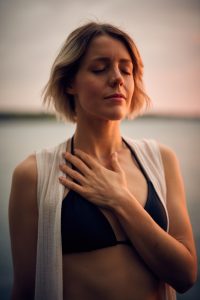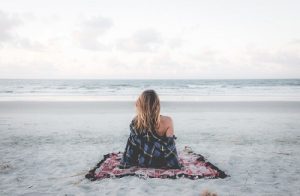Relaxed people take the state of relaxation for granted whereas tense or stressed human beings often wonder how to let go and ease into their day.
![]()
People pay for sedatives and antidepressants, drink themselves into oblivion, they undertake meditation courses and retreats all to learn to relax. They diet for relaxation purpose and attend courses to learn band-aid techniques.
In order to find out what prevents us from relaxing, we need to investigate more into what relaxation actually means for mind and body.
“Relaxation stands quite generally for a release of tension, a return to equilibrium. A relaxation technique is an activity that helps a person to relax. Relaxed in Flow (psychology), a state of arousal, flow, over-learned self-control and relaxation. Relaxation (psychology) is the emotional state of low tension.”(Wikipedia)
Spinning thoughts
Many of my Yoga students and therapy clients experience the same phenomena, that in spite of better knowing they just cannot stop the speed of their thoughts and the direction of their thinking.
Most thinking revolves around past or future events.

There are very few ‘authentic’ thoughts, which revolve in the ‘here and now’ that people in our western societies think. The art of slowing down our thoughts is vastly underrated, indeed there is often the stigma of laziness being projected onto cultures where people simply sit and gaze or do nothing.
Most stresses come from fear. Asking my clients about fear often results in them not being consciously aware of being fearful. Especially men in average appear not to admit to themselves easily their fears.
High expectations
The conditioning of society often teaches to pretend that we are ok, fit and strong, rather than to admit to what really is.
“I don’t want to be dwelling in negative thoughts” Martin, a 54 year old therapy client, expressed in the beginning when we first met.
He came to me with serious muscular tension that began to affect his heart functions and prevent him to work in his panel beating business. It took him by surprise when I pointed out to him that there is no physical stress without mental stress. Throughout the treatments, we identified some deep fears, which had been pushed away, but not really processed.
The unconscious part of Martin’s brain was continuously worried about a failing marriage and his fears around bypassing life. In a combination of deep tissue body-work, a regular short Yoga practice, and an ongoing self- inquiry process Martin got gradually hold of his stress and began to relax more frequently.
The more he understood that it was only human to feel trapped, angry, sad, etc. the more he began to embrace what he needed to do to create a life that would leave him to feel relaxed in his day today.

Being honest, being real “Sattva”(truth in Sanskrit) is one of the core philosophical principles of Yoga and of many other philosophies.
“Repression is not the way to virtue. When people restrain themselves out of fear, their lives are by necessity diminished. Only through freely chosen discipline can life be enjoyed and still kept within the bounds of reason.” (Professor of Positive Psychology Christopher Csikszentmihalyi, University of Berkley, California)
A state that Professor Csikszentmihalyi researched was, that what he called the autotelic personality. The autotelic personality is one in which a person performs acts because they are intrinsically rewarding, rather than to achieve external goals.
He describes the autotelic personality as a trait possessed by individuals who can learn to enjoy situations that most other people would find miserable. Research has shown that aspects associated with the autotelic personality include curiosity, persistence, and humility.
This combination we can also find in children, which are still in their “natural” state unassuming, open and curious.
So how can we get back there?
As usual, there are many ways that lead to the same destination. Honesty and openness to change, gaining the awareness of what to change and the courage to undertake the necessary actions appear to be principal prerequisites for a life with more moments in a relaxed, flowing state.
To take these steps one actually needs to pause at times and admit to ‘what really is’, thus taking time is a profound part of relaxation.

